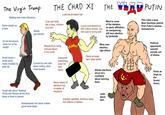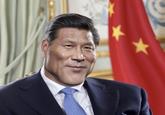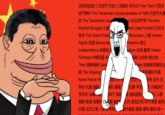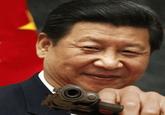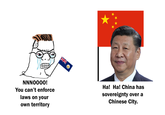Xi Jinping
Part of a series on China. [View Related Entries]
[View Related Sub-entries]
This submission is currently being researched & evaluated!
You can help confirm this entry by contributing facts, media, and other evidence of notability and mutation.
About
Xi Jinping is a Chinese politician and the incumbent president of the People's Republic of China, as well as the General Secretary of the Communist Party of China, the ruling party of China. He is simultaneously praised and criticized online and in international media.
Online History
In 2012, Xi Jinping was elected to the General Secretary of the Communist Party. Because China is a one-party state, this made him the "paramount leader" of China and the first one born in the People's Republic of China.[1]
Xi Jinping Thought
Xi has garnered a large online following from modern day communists for his contributions to Socialism With Chinese Characteristics, solidified in the Chinese constitution as "Xi Jinping Thought." The 14-point policy is as follows:[2]
1) Ensuring Communist Party of China leadership over all forms of work in China.
2) The Communist Party of China should take a people-centric approach for the public interest.
3) The continuation of "comprehensive deepening of reforms".
4) Adopting new science-based ideas for "innovative, coordinated, green, open and shared development".
5) Following "Socialism with Chinese characteristics" with "people as the masters of the country".
6) Governing China with the rule of law.
7) "Practise Socialist Core Values", including Marxism, communism and "Socialism with Chinese characteristics".
8) "Improving people's livelihood and well-being is the primary goal of development".
9) Coexist well with nature with "energy conservation and environmental protection" policies and "contribute to global ecological safety".
10) Strengthen national security.
11) The Communist Party of China should have "absolute leadership over" China's People's Liberation Army.
12) Promoting the one country, two systems system for Hong Kong and Macau with a future of "complete national reunification"; and to follow the One-China policy and 1992 Consensus for Taiwan.
13) Establish a common destiny between Chinese people and other people around the world with a "peaceful international environment".
14) Improve party discipline in the Communist Party of China.
Criticism
Censorship
Xi Jingping has continued China's long-running stance on censorship. Due to this, many online have been unable to voice criticisms against the Chinese president. During his time in power, his government has banned online discussion and memes that are critical of the president, including images of Winnie the Pooh, Lian Xiangi's Eye Roll, books by political writers like George Orwell and the letter "N." The Washington Post[3] said, "Censorship has been significantly stepped up in China since Xi took power."
Winnie the Pooh Controversy
On July 17th, 2017, Chinese censors blocked memes featuring Winnie the Pooh after several viral images began circulating online that suggested a resemblance between the bear and Chinese president Xi Jinping (example below).

On August 3rd, 2018, the Disney film Christopher Robin, a live-action adaptation of the Winnie the Pooh characters was banned in China. According to the Hollywood Reporter,[5] "A source pins the blame on the country’s crusade against images of the Winnie the Pooh character, which has become a symbol of the resistance with foes of the ruling Communist Party, namely Chinese leader Xi Jinping."
Abolishment of Term Limits
In 2018, under the leadership of Xi, the Communist Party of China introduced a bill that would allow Xi Jinping to be continually reelected until his death or retirement, doing away with an old law introduced by Deng Xiaoping that limited the terms of China's rulers, in an effort to counteract the rising of a new Mao Zedong.
On March 11th, 2018, 2,958 delegates in Beijing's Great Hall of the People voted to amend the constitution in favor of abolishing term limits. Two voted against the amendment and one vote was marked invalid.
However, many were critical of the policy change, believing this to be move backwards in China's history. Steve Tsang,[4] director of the China Institute at SOAS University of London, said, "Xi is now unquestionably a Leninist strongman."
The Former Editor of China Youth Daily Li Datong said, "It's a historic regression."
Search Interest
External References
[1] The Famous People – Xi Jinping Biography
[2] Wikipedia – Xi Jinping Thought
[3] The Washington Post – China’s Xi Jinping unveils his top party leaders, with no successor in sight
[4] The Washington Post – Xi cleared to rule indefinitely as China officially scraps term limits
[5] The Hollywood Reporter – Disney’s 'Christopher Robin' Won't Get China Release Amid Pooh Crackdown


![Meanwhile in the Red Dragon Rising DLC... I was just joking when I said all that stuff online about you, Xi. Now please let me go. [Perception 7] I managed to make out where you took me while you had the bag over my head. We're in Langfang. [Science 85] <Reprogramme him by reciting the Tiananmen copypasta.>](https://i.kym-cdn.com/photos/images/list/002/577/176/338.jpg)

